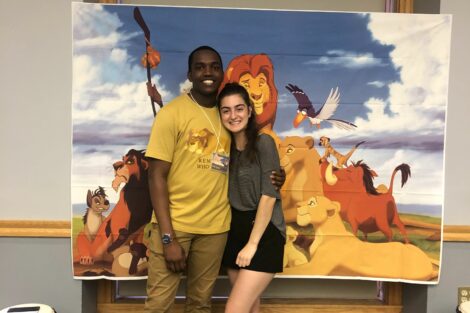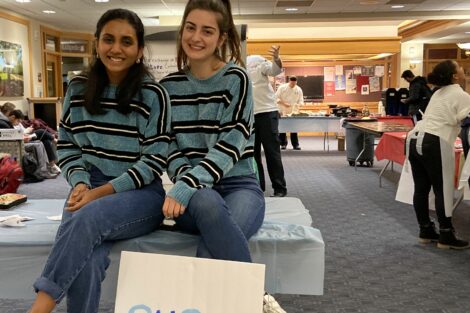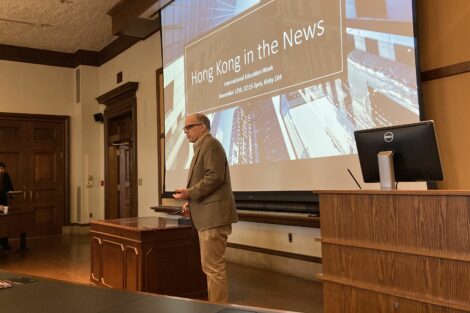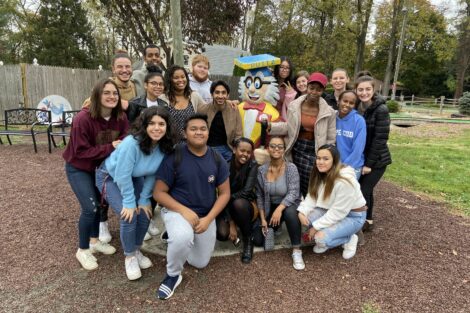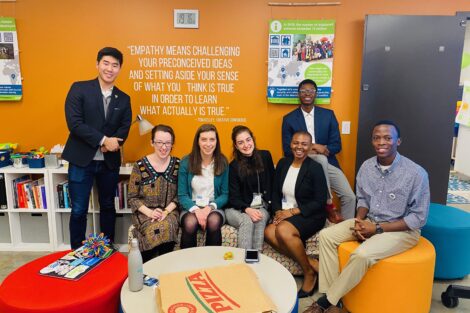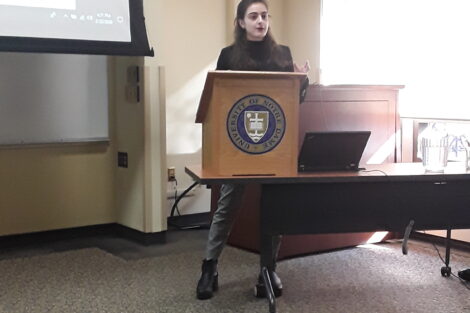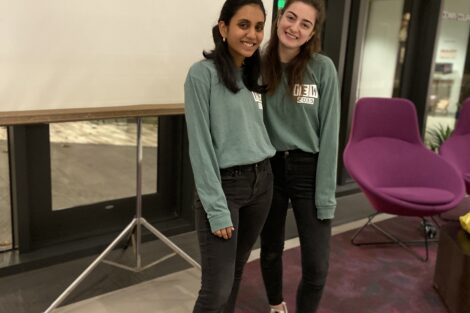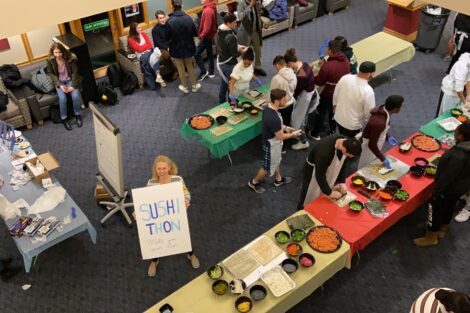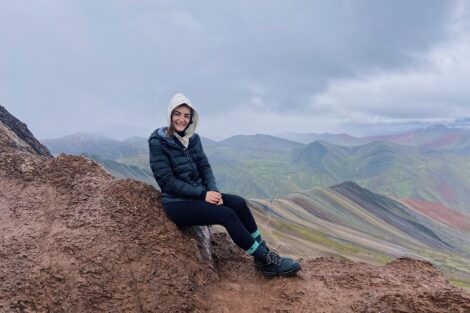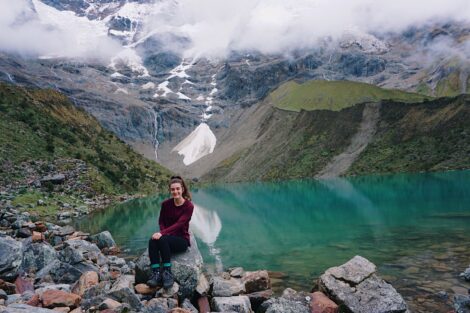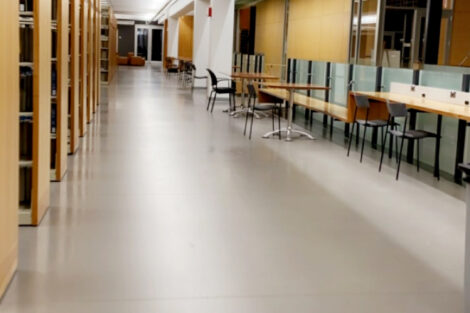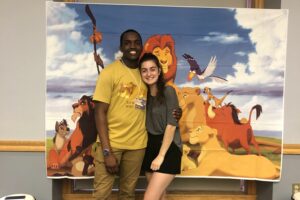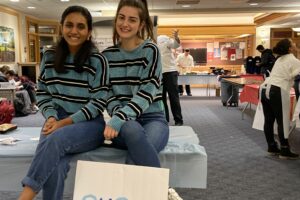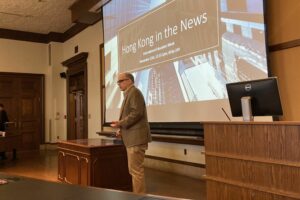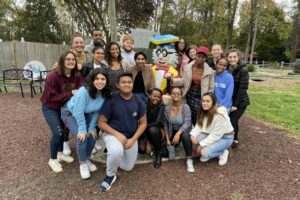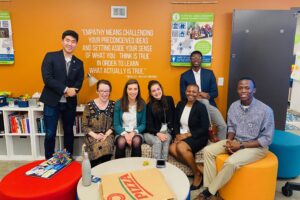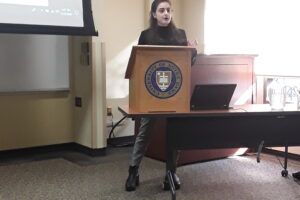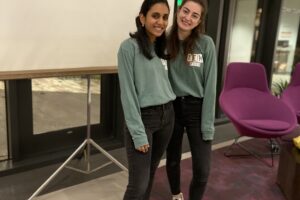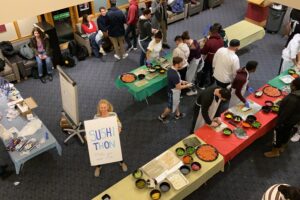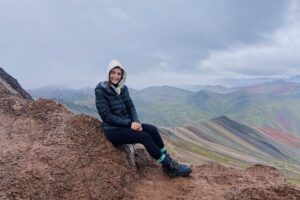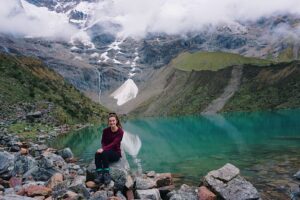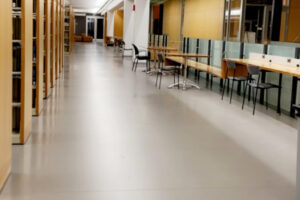What was it like being at home and doing remote learning?
It went quite well for the most part, though the time change was slightly inconvenient at times. However, once I developed a routine that worked, I was able to stay on top of my schoolwork and other responsibilities in an efficient and timely manner. All of my classes were “live” lectures, so we were having discussions via Zoom and Google Meet. Though it isn’t like being in a classroom, I think there was still a lot of the same dynamics in terms of participation and quality of discussions.
While the circumstances for the second half of the semester were difficult, what positives did you discover in the situation?
I feel like at Lafayette I am always doing a million things and don’t always have time to engage with what I am learning in the classroom thoroughly. I found myself having more time to do my work and, as a result, feel like I was able to learn at a much deeper level. I had a lot more time for myself, and so I have also been able to sleep and exercise more, which has been good for my health. I have also appreciated having more time to spend with my family, who I haven’t been able to spend much time with the past three years.
What was your favorite class or two last school year?
One of my favorite classes was Gender and Development in the Global South with Professor Hannah Stewart-Gambino. It is a topic that I am very interested in, and I loved all of the conversations and debates we had in class. Though I have taken several courses related to development in the global South, it was my first time looking at the topic through the lens of gender, and I found my personal views on the topic evolving as the semester went on. It is a class that has significantly shaped my thinking and a class whose concepts I find myself continually applying to other conversations that I now have. Another class that I really enjoyed was Capitalism and Its Critics, with Professor [William] Callison. Not only was the course very timely and relevant in the face of COVID-19, but it also taught me the foundations of capitalism, which I think is very beneficial when it comes to analyzing it in our present-day context. I enjoyed reading the foundational texts (Smith, Locke, etc.) and enjoyed reading the critics (Marx, Polanyi, etc.) because it allowed me to develop a robust theoretical framework through which I can now discuss capitalism and its shortcomings.
Who are a couple of professors who made an impact on you?
I took Global Environmental Sustainability with Professor [Caleb] Gallemore during my freshman year, which completely altered my trajectory at Lafayette. It is thanks to his class that I pursued international affairs as a major and, thanks to a project we did in class, that I became very interested academically in the topics of development and food security. Since then, Professor Gallemore has helped further foster and shape my academic interests. While taking his class Mapping World Cities, I asked him if I could somewhat modify the final project so I could build on field research that I had done during my semester abroad in Uganda. He said yes and since then has been very supportive and helpful in other research endeavors that have stemmed from my project in Uganda. That class also introduced me to GIS, and Professor Gallemore has helped me develop skills that went beyond the class so that I could apply them to other research projects I wanted to carry out. This past semester, I did an independent study alongside Professor Gallemore, which has really challenged my thinking and enabled me to explore further my interests in food security and refugee settlement planning. It is a project that we are still working on together in preparation for my honors thesis next year. Professor Gallemore has helped me see the endless possibilities of research in the social sciences by showing me how I can incorporate GIS, statistics, and data science into my work. I have been able to cultivate my personal research interests thanks to his support, and I am very grateful for that.
Professor [Cory] Fischer-Hoffman has also had a very positive impact on me. I first began working with her as a research assistant, and have since taken a class with her. I love all of my conversations with Professor Fischer-Hoffman; I always find that I learn a lot and am challenged to think in new ways. By working alongside Professor Fischer-Hoffman as a research assistant, I have learned a lot about a topic I am not at all familiar with, mining, as she is studying the role Bethlehem Steel had in Latin America. I have also learned a lot about the research process at the level of an academic professor. I have been able to apply my Spanish-language skills to help with her research, which has also made me rethink some of my regional interests. Thanks to her work, I have started self-studying and learning a lot more about Latin America, a region I was previously not very familiar with. My conversations with Professor Fischer-Hoffman have motivated me to stay true to my passions and to fight for what I believe to be important. She has taught me not to settle and to embark on a professional career that continually challenges and stimulates me.
Who are a couple of staff members who made an impact on you?
Janine Block has really been very supportive of all the ideas I have had for ISA over the years. She has been instrumental in helping me bring my ideas for ISA to fruition. I have learned so much from her about all the behind-the-scenes details you have to think about when planning an event. Through the work Janine does, I have realized the importance of small details in making a good event a great event. I have learned a great deal from her about leadership, team building, collaboration, event planning, logistics scheduling, and more. Thanks to her and past ISA presidents as well, I have taken on significant leadership opportunities in ISA as head peer adviser, an organizer for International Education Week, and president.
Dean [Julia] Goldberg has also been very helpful this past year. She has really encouraged me to seek out scholarships, and I have learned so much in the process of writing and rewriting scholarship applications. Without her support and guidance, I would not have had some of the opportunities I have had this past year. She has helped me discover the connection between a lot of my courses and extra-curriculars and use those to guide my academic and professional interests in the future.
What was the highlight of the school year for you?
I really enjoyed the planning and organizing process of International Education Week. This is the second time that Sumini [Siyambalapitiya ’21] and I organized the week, and I love the brainstorming phase because we are forced to think very creatively to design events that people will be curious about and want to attend. We are always faced with several challenges, and even though it can be very stressful and overwhelming at times, we learn so much from that. I have also learned so much about leadership, organization, delegation, responsibility, event planning, teamwork, collaboration. These are all skills that are so valuable in many other facets of my life. I also get to work with so many other students and meet a number of interesting people in the process. I also cherish the whole planning process because it is thanks to that that Sumini and I have become as close as we are, and that’s something I value a lot! Despite being quite tired throughout it all, I look forward to all our late-night homework sessions in RISC.
I also traveled to Cusco, Peru, for a January interim program to study climate change in the Andes, and that was an incredible experience. It has made me rethink some of my academic interests and what I want to do in the future.
Finally, I was able to present a research paper that I wrote during my semester abroad in Uganda at the Human Development Research Conference at the University of Notre Dame at the end of February, and that was a really cool experience. It was my first time ever attending a research conference, and I found it so enriching. It was really nice to meet so many other undergraduate students who had done field research abroad and learn about their work. The whole experience inspired me to keep doing research and reinforced how valuable research can be. The guest speaker at the conference was Susan Page, the former ambassador of the U.S. to South Sudan, which I was so excited about because my research project was about South Sudanese refugees in Uganda, and I have also done a separate research study on disarmament in South Sudan.
What internships do you have this summer?
I have two remote internships. The first is for the Global Livingston Institute (GLI), a research institute based in Uganda that carries out significant programs and projects related to community development in Uganda and Rwanda. As a workforce development research coordinator, I am responsible for researching workforce development statistics, relevant initiatives within the continent, and local-level partnership building to better inform the GLI’s program development. In the face of COVID-19, I am also helping with the planning and transition of in-person training to remote training for their beneficiaries.
The second internship is for a freelance human rights artist, Namaya, who devotes his work to peace-building, raising awareness about the adverse effects of war and the U.S. military around the world, and human rights. He also has community-building projects for peace in eight different countries. Currently, I am helping with securing partnerships for future museum exhibitions (though this is a bit challenging at the moment). I am also line editing and copy editing two books about Namaya’s travels to over 100 countries.
How were you able to get these internships?
While I was in Uganda, I was lucky to meet the founder of the Global Livingston Institute, who then connected me with the local staff in Kampala. After meeting with them, I asked if they had an intern program, and they said yes, so when applications opened for this summer, I rushed to apply. I loved the integrity with which the GLI operates, and thought it would be an excellent opportunity for me to learn more about development and research at a practical level.
I secured the second internship through UpWorks, a website for freelance workers. After applying to over 30 jobs with no luck, I finally received one response. While the UpWorks job was meant to be editing a short paper, Namaya told me he was so impressed with my resume, and with what I had accomplished thus far in my life that he offered me a paid part-time summer internship.
What value do these internships have for you?
My internship with the GLI is allowing me to learn about on-the-ground NGO programming, securing funding for projects, monitoring and evaluation, following up with beneficiaries, and other operational and logistical considerations. While I have taken a number of courses on development and on Sub-Saharan Africa, I haven’t had the chance to apply that knowledge to on-the-ground work. I am considering NGO work in the future, so it is a great opportunity to learn more about how NGOs operate. I was planning on returning to Uganda this summer to continue pursuing a personal project that I have been working on, and this internship served as an excellent gateway for that; however, those plans have been put on hold.
My internship with Namaya is something very new for me, but I find it very rewarding and fulfilling. I love traveling and am really enjoying being able to edit his books about his travels. I am learning through his experience, but I am also able to apply my knowledge and experience to his work. It is very interesting to be learning about peacebuilding through the medium of art. It is something I am not familiar with, but I am slowly becoming very fascinated by it, especially because I hope to one day use documentaries as a medium for peacebuilding.
What else will you be doing with your time this summer?
I am going to keep working with Professor Gallemore on an academic research paper that I am hoping to publish. I am going to be studying for the GRE and starting my applications for graduate school and some scholarships. I also am taking some free online courses via Harvard University. There are also a few personal projects that I have been working on that I am looking forward to finally finishing up.
What are you hoping to accomplish as president of ISA?
My main goal is membership retention and capacity building within ISA. ISA has grown tremendously in the past few years, and I want to help create formal structures and processes that can ensure that this growth continues. This is especially important in the face of COVID-19, as there is a high chance that a number of international students, especially incoming freshmen, will not be able to come to campus. It is important for us to find innovative and creative ways to engage these students and make them feel like a part of the campus community, even if they are far away. Secondly, I want to create spaces that foster meaningful conversations about the international student experience and use such conversations to engage in ongoing dialogue with the administration regarding international student needs. Finally, I want to leverage the ISA community’s pool of skills, talents, and knowledge to increase the breadth, depth, and scope as an organization on campus. I want to focus on bringing more awareness to international issues on campus.
What do you do for fun?
I really enjoy going on walks, bike rides, hikes, and simply being outdoors. I also enjoy exercising and dancing. I love music as well—listening to music and playing music. I’ve played the cello since I was in first grade. I also really love photography and videography.
Who's one of the most interesting students you've met at Lafayette?
This is a hard question! Tomoki [Sasaki ’19] stands out. I remember when I first met him thinking we would probably never be friends. I found him a bit intimidating! But we started to get closer when I joined the ISA Board (which I did thanks to him pushing me), and have been friends ever since. Tomoki grew up in several different countries, and we connected on the idea of being an “international student” because we had some similar experiences. I always find his stories from when he was younger to be very interesting. He is also a very intellectually stimulating person, and conversations with him have reframed my understanding of academia and possibly being a professor in the future. Conversations with him also challenge my thinking and have helped me form my nuanced understanding of Lafayette, as well as the broader world in general, and our place in it. I think he also stands out because our personalities on the surface appear to be super different, but we get along very well.
What did I miss about you?
In my first year at Lafayette, I decided to sign up for the winter interim trip to Senegal with Professor (Wendy) Wilson-Fall and Professor Lee. I had a Lafayette stipend and decided to use it for this trip, as I had wanted to go to Senegal at the end of high school, which seemed like the perfect opportunity. The experience indeed marked a difference in my life trajectory because I discovered that I had a deep passion for travel. (I also made some of my closest friends at Lafayette on that trip.) I also really appreciated having courses while there, as I found that the whole experience to be so much more enriching than just having visited the country as a tourist. Since then, I have really made meaningful and responsible travel a big priority in my life. I have several campus jobs and am constantly saving up to be able to go somewhere new. Going to Senegal inspired me to take advantage of the winter interim period, and since then, I have self-funded interim trips to India and Peru. I initially wasn’t going to study abroad as I already felt that I was abroad by being in the USA, but I decided to spend my sophomore spring in Uganda. I picked Uganda because I am very interested in refugee issues, and Uganda is one of the top refugee-hosting countries in the world with some of the most welcoming and inclusive policies for refugees. Part of the program was a one-month independent study, and I was able to study food security and food aid in refugee settlements in the north of the country during that period. As an international affairs major, travel has also allowed me to develop a more profound understanding of how the world operates. It has also made me a much more confident, empathetic, and well-rounded person.
